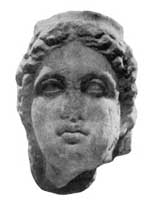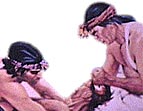The Music Tiger:
Although Dr. Valerio Manfredi's take on Alexander did not make it in the race to produce an epic film about him, he is apparently busy collaborating with Dino De Laurentis and a couple of other historical projects:
"De Laurentis took an option on The Last Legion, Manfredi's novel which merges the last days of the Roman empire with Arthurian legend. Production should start next year, with Anthony Hopkins being talked of as a likely star. If anything, however, Manfredi is more enthusiastic about his own screenplay of another historical novelist's work, the widely acclaimed Memoirs of Hadrian, by Marguerite Yourcenar. It is going ahead, he explains, with Antonio Banderas as Hadrian and John Boorman directing.
Responding to occasional criticism from peers over his film involvement, Manfredi has observed in the past that 'a minority read books, while millions go to the cinema. You have to simplify, condense.' Mention Ernest Hemingway's famous comment about writing for the studios - 'You throw them your book, they throw you the money. Then you jump into your car and drive like hell back the way you came' - and he laughs. He would certainly have reservations about giving his work to certain directors, he says, although he regards his Memoirs of Hadrian screenplay as (relatively) safe in Boorman's hands - 'unless he has to make cuts ... But we have control of the screenplay.'"
Subsection of Roman Times:
A weblog of links to and abstracts from academic presentations on the Roman Empire
Monday, December 27, 2004
Wednesday, December 15, 2004
Roman influence in Chersonesos
 Chersonesos
Chersonesos
I noticed that this month's History Today featured an article about the ancient city of Chersonesos near Sebastopol in the Ukraine. It was referred to as the Ukrainian Pompeii so I was naturally interested in learning more. I found the official site of the National Preserve of Tauric Chersonesos and it included an extensive history of the city and its interaction with the Roman Empire.
"After Rome subdued the kingdom of Mithradates VI Eupator, Chersonesos found itself subordinate to Bosporos and remained so until Julius Caesar granted the city its eleutheria (freedom). A Chersonesan decree in honor of Gaius Julius Satirus, an ambassador to Julius Caesar, indicates that Chersonesos received its independence in 46-45 BC. After Caesar's death the Bosporan king Asandros attempted to subordinate Chersonesos once again, but the city successfully retained its independence. Around 25-24 BC Augustus normalized relations between the Chersonesan civil community and the Bosporan dynasts. Under the initiative of the Roman administration, Bosporos and Chersonesos created a defensive union which existed until war broke out between Rome and Bosporos. Chersonesos joined the side of Rome during the war, after which Chersonesos was granted certain privileges. The Roman administration became responsible for defending the city from the barbarian tribes. In the mid-60s AD the legate of the Roman province of Moesia, Tiberius Plautius Silvanus, aided Chersonesos in defeating the barbarians who were threatening the city. After these events the Roman authorities started to intervene in the internal politics of Chersonesos more forcefully, a circumstance which was reflected in the issue of coinage. Evidence which attests to the city's growing dependence on Rome during the Flavian dynasty includes the appearance in Chersonesos of statues of the Roman governors of Moesia, and the custom of granting the Chersonesan aristocracy Roman citizenship, a practice reserved for those regions outside the Roman empire which would soon become Roman provinces."
Friday, December 10, 2004
Australian Celtic Festival to Feature Roman War Machine
Gleninnes.yourguide: "Spectacular, colourful, new...that's what sums up the revamped Australian Celtic Festival, according to festival committee chairman Howard Eastwood.
The festival committee has big plans for the April festival, some which include explosive new attractions such as the firing of a replica Roman war machine similar to one used in the long and bloody campaigns during the Roman Empire's reign.
'The festival is now very much a national event and bridging on the international, attracting people from as far as Scotland,' festival committee chairman Howard Eastwood says. 'It's the opportunity for Australians to come together to pay homage to their Celtic heritage or simply to enjoy all things Celtic.'
There are plans to test fire the war machine at sunset on Thursday, April 28, from the Australian Standing Stones. The machine would shoot a spear with a flaming head from the Stones to the safety of open space."
The festival committee has big plans for the April festival, some which include explosive new attractions such as the firing of a replica Roman war machine similar to one used in the long and bloody campaigns during the Roman Empire's reign.
'The festival is now very much a national event and bridging on the international, attracting people from as far as Scotland,' festival committee chairman Howard Eastwood says. 'It's the opportunity for Australians to come together to pay homage to their Celtic heritage or simply to enjoy all things Celtic.'
There are plans to test fire the war machine at sunset on Thursday, April 28, from the Australian Standing Stones. The machine would shoot a spear with a flaming head from the Stones to the safety of open space."
Thursday, December 09, 2004
New BrainPOP Movies Teach Kids About Ancient Rome
'When in Rome...' New BrainPOP Movies Teach Kids About Ancient Rome: "BrainPOP (http://www.BrainPOP.com), the leading destination for educational Math, Science, and English animated content for kids, has added four new movies to its growing Social Studies library. BrainPOP's ROMAN REPUBLIC, RISE OF THE ROMAN EMPIRE, PAX ROMANA, and FALL OF THE ROMAN EMPIRE movies will give students a solid overview of the history of Ancient Rome. With Rome as their backdrop, Tim and his robot pal Moby lead kids through Rome's Republican beginnings, through the rise of Augustus Caesar and the cultural flowering of the Pax Romana, to Rome's destruction by barbarians. From rise to fall, BrainPOP's movies offer a perfect introduction to Rome for use at school or in the home. Each movie is accompanied by a 10-question interactive quiz, crossword puzzle, timeline, comic strip, and its very own fact sheet or experiment. BrainPOP's new ROME movies are part of the company's expansion of its award-winning content library to include topics in ancient and world history. BrainPOP subscribers will be able to access the new ROME movies in the Social Studies section along with recently added topics including titles like SUMERIANS, GREEK GODS, and ATHENS."
Did Roman Baths prompt the development of ancient plastic surgery?
 Ancient Roman Medicine:
Ancient Roman Medicine:
This past week I watched a special on the Discovery Channel about ancient plastic surgery. I had seen a program earlier about how surgeons in ancient India developed nose repair techniques that are still in use today. This information was included in the new program but was augmented by an interesting discussion of Roman plastic surgery. The narrator said that the most important influence on the development of plastic surgery in ancient Rome was the social emphasis on bathing in public baths. To avoid scandalous remarks, many men with battle scars on their backs, or worse, scars from flogging, sought a remedy from Roman surgeons. This was especially true of former slaves who sought to have brands or whip marks removed. I was surprised to learn that one of the most commonly requested procedures was circumcision reversal. Another procedure described was male breast reduction.
Since the Discovery Channel gets a little over zealous in its documentaries at times, I was a little dubious. But, I found this article with references that presented consistent information:
"It was war injuries, of course, that really advanced Roman surgery. If you were lucky, your military unit would have a good medicus/chirurgus who could patch you up before you bled to death, and if you were really lucky he might retire to the same colonia that you were pensioned off to. (Chirurgus was really a corruption of the Greek word for surgeon, which transliterates into English as 'cheirourgos'. The pure Latin phrase for surgeon was actually 'medicus vulnerarius', which means, literally, 'wound doctor'.) Roman military surgeons were, in fact, only rivaled by specialist arena surgeons, who repaired valuable gladiators.
Roman surgeons were also adept at several forms of minor plastic surgery. They did facial and other repairs, removed growths, etc. The most common operation appears to have been male de-circumcision. Reversal of genital mutilation, which might have been the result of religious observance or mischance, was an important procedure which one would seek in order to avoid embarrassment when appearing naked at the baths or in the gymnasia."
The program also mentioned that the Emperor Elagabalus asked a Roman surgeon to perform a sex change operation on him. However, it said there was no further evidence that such a procedure was, in fact, done. The narrator mentioned coyly that when Elagabalus was assassinated, it may have been the first assassination of of a Roman Empress!
Subscribe to:
Posts (Atom)